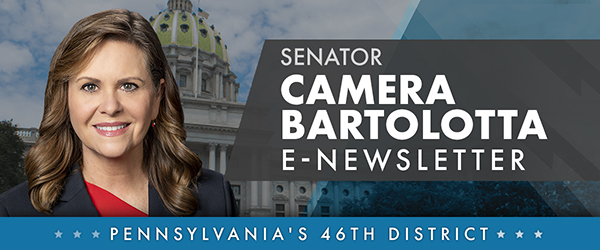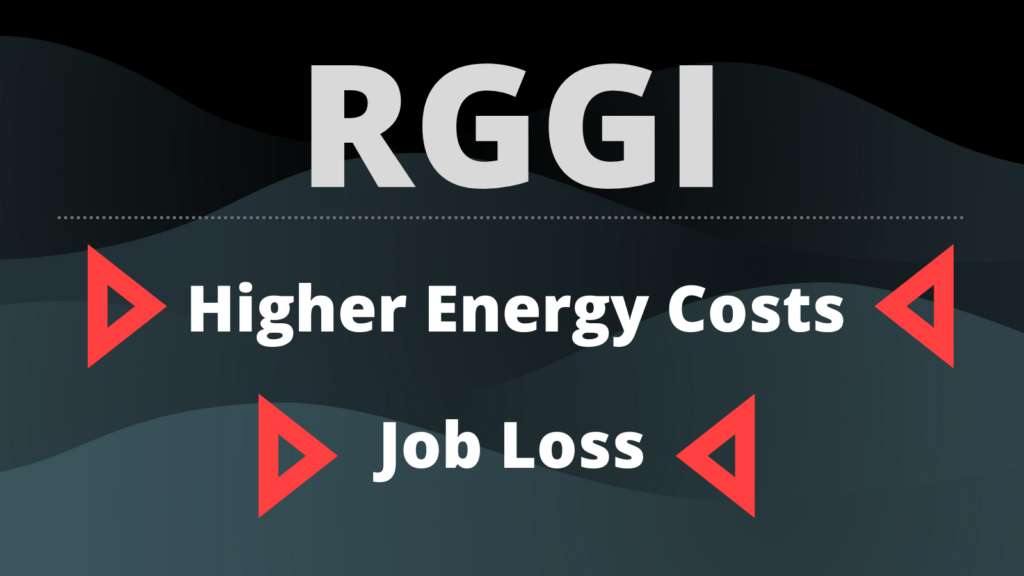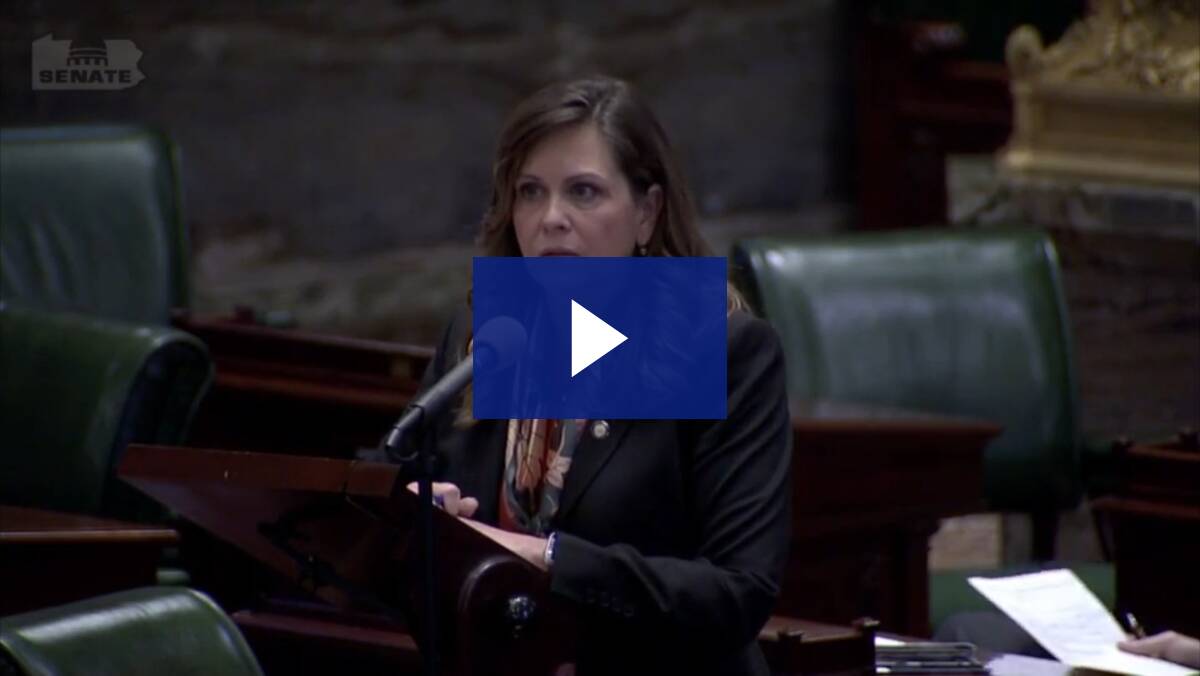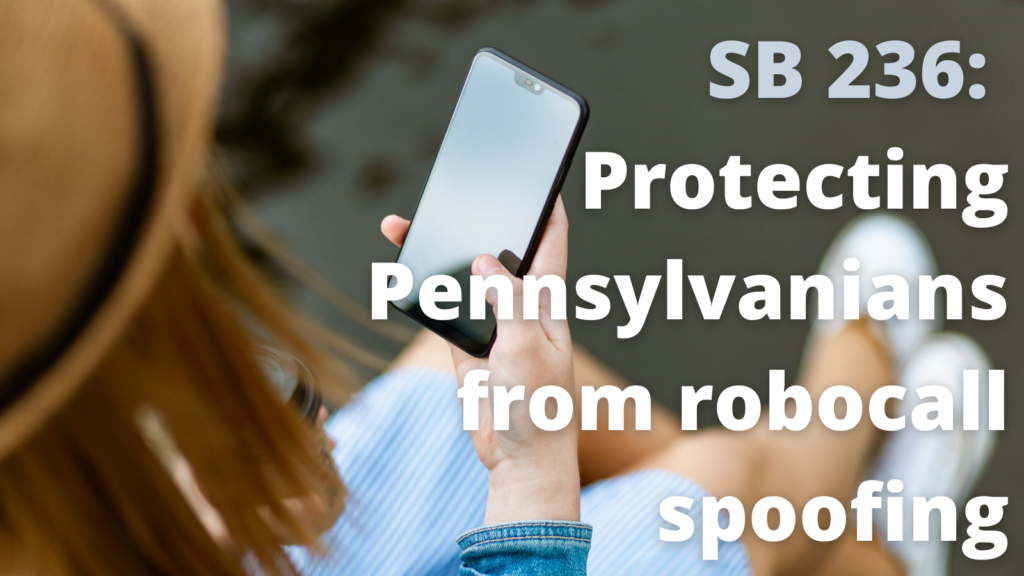
|
||||
|
In this Update:
Keeping Americans’ Banking Info PrivateThe Senate Banking and Insurance Committee advanced a measure that would call on U.S. Congress to oppose any effort by the Internal Revenue Service (IRS) and the Biden Administration from looking into private financial banking transactions. I authored the resolution with Senator Kristin Phillips-Hill (R-York) after hearing from constituents who were concerned when the plan by the federal government was first introduced earlier this month. The initial plan would have allowed the IRS to monitor all withdraws and deposits exceeding $600. The latest iteration of the plan increased the threshold to $10,000. Phillips-Hill argued that regardless of the threshold, the average American has inflows and outflows of more than $61,000. In 2015, the IRS had more than 700,000 taxpayer accounts compromised in a hack that led to the release of Social Security numbers, dates of birth and tax filing status. If the federal government goes down the path of examining banking transactions, many consumers could be pushed out of licensed and insured financial institutions. The resolution advances to the full Senate for further consideration. Our statement, including a link to my remarks from committee, can be found here. Calling for Enactment of Bill Clarifying CDL Requirements for FarmersAfter receiving support from the General Assembly, legislation I sponsored allowing farmers to use a Class A, B or C driver’s license when operating farm vehicles with a combined weight of more than 26,000 pounds on roadways is poised for enactment. A Class A driver’s license is a graduated license above the common Class C license and requires an additional road test and fee. Act 170 of 2014 clarified that farmers did not need a CDL when operating farm trucks, or farm trucks hauling trailers, with a combined weight of more than 26,000 pounds. However, it was unclear as to whether a farmer could use a Class C or Class A driver’s license when operating those vehicles. Even though Act 170 was supposed to reduce burdens on farmers, the Pennsylvania State Police is requiring farmers to have a non-commercial Class A driver’s license with weights that exceed 26,000 pounds. This legislation will deliver the support our farmers need to make the supply chain challenges they face a bit easier. It removes the burden they faced when operating their farm equipment. When my bill becomes law, they will be able to fully focus on the demanding job of providing our state with consistent access to fresh fruit, veggies, milk and meat. If Senate Bill 725 is not vetoed within 10 days from Oct. 27, it will be enacted into law. 46th District Receives Farm to School Program FundingThe Department of Agriculture has announced grant funding that has been awarded through the Farm to School Program. Locally, the 46th District was awarded more than $25,500. California Area School District received $15,000 to develop poultry and pollinator curriculum. The Intermediate Unit 1 received $8,303 to partner with Republic Food Enterprise for students to grow their own produce through hydroponics and cold frame boxes. The funding will also be used to facilitate the development of culinary skills through cooking demonstrations. Finally, Washington School District received $2,200 for the procurement of food from local farms to increase nutrition and healthy eating habits. Additional information on this program can be found here. Disapproving Pennsylvania Joining the Regional Greenhouse Gas Initiative
Seeking to assert the Pennsylvania General Assembly’s role regarding the Commonwealth entering into multi-state compacts and levying taxes, the state Senate voted to disapprove a regulation by the state Environmental Quality Board (EQB) to have Pennsylvania join the Regional Greenhouse Gas Initiative (RGGI). Here are my comments about the damage joining RGGI would do to Pennsylvania residents and businesses. Gov. Tom Wolf three years ago said Pennsylvania was doing a great job reducing carbon dioxide (CO2) emissions, and that it wasn’t necessary to sign on “to something we’re already doing a better job on.” However, two years ago the governor flip-flopped and then circumvented the legislative process, unilaterally forcing Pennsylvania to join the current 11-member coalition of RGGI states. No other RGGI state has joined the coalition without the approval of that state’s legislature, and none of the other states comes close to having Pennsylvania’s number of electricity production facilities. The RGGI coalition operates what is called a CO2 “cap-and-trade” program, though the cost of the “emission allowances” traded within the program is, effectively, a tax on CO2 emissions by electricity producers. The concurrent resolution now goes to the state House of Representatives, which has a window of 10 legislative days or 30 calendar days to pass the resolution and present it to the governor. If Gov. Wolf vetoes the resolution, it will return to the Senate, which may consider overriding the veto. Two-thirds of the Senate must support the resolution to override the veto. Should the Senate override the veto, the measure would then go to the House where the same two-thirds vote is required. Even if a veto is not overridden, the process is probably far from complete, with an expectation this will end up in the courts, which will likely be asked to determine if imposing a CO2 tax is beyond the scope of the executive branch’s unilateral authority. Additionally, as this was initiated by executive order and not by state law approved by the General Assembly, Pennsylvania could very well be withdrawn from the RGGI by a future governor. Click here for more information, including my official statement. Overcoming Barriers to Quality Health Care
The Senate approved legislation to promote telemedicine to overcome barriers to quality patient care created by distance and reduce the costs of those services. Telemedicine is a rapidly growing component of health care, and many health care professionals and hospitals in Pennsylvania are already providing services via telemedicine. However, currently none of the health care professionals’ licensure acts explicitly authorize or regulate practice via telemedicine. Senate Bill 705 defines “telemedicine” as “the delivery of health care services provided through telecommunications technology to a patient by a health care practitioner who is at a different location,” and allows anyone with a medical license or otherwise regulated by Pennsylvania law to provide telemedicine services. Through the use of telemedicine, specialists and other health care providers are able to expand their reach, helping COVID-19 patients, high-risk patients, stay-in-home patients, and rural patients who would have the ability to stay in their communities, avoiding long-distance travel for specialized care. The legislation now heads to the state House of Representatives for consideration. Senate Approves Bill to Boost Gifts to Charities
The Senate approved legislation that will make it easier for charities and nonprofit organizations to receive large financial gifts via Charitable Gift Annuities to fulfill their missions. The bill will be sent to the state House of Representatives for consideration. Charitable Gift Annuities provide donors the opportunity to support a charitable organization, while receiving fixed annuity payments. The payments can begin immediately, or the donor can choose to defer the payments to a future date. The terms of the arrangement are set forth in a contract signed by the nonprofit and the donor. The arrangement terminates on the death of the annuitant, at which point the nonprofit uses the remaining funds on its mission. Under current law, it is very difficult for smaller charitable organizations to utilize Charitable Gift Annuities, because the amount of unrestricted cash or publicly traded securities needed to cover the minimum is impractical and unworkable. A smaller foundation or charity must commit a significant amount of foundation resources to the annuity and not to its mission. Senate Bill 731 would allow charities to transfer their risk to a commercial insurance company, which will match substantially all future payments of the charity arising from a charitable gift annuity contract obligation. The change will allow a small nonprofit organization to receive a large charitable gift annuity that it previously may have been prevented from receiving. Heating Assistance Program Open Now
Residents who struggle with their home heating bills can now apply for assistance from the Low-Income Home Energy Assistance Program (LIHEAP). LIHEAP is a federally-funded program that helps individuals and families pay their heating bills through home heating energy assistance grants. It also provides crisis grants to help in the event of an emergency or if a resident is in danger of losing his or her heat due to broken equipment, lack of fuel or termination of utility service. The income limit for LIHEAP for an individual is $19,320; for a couple, the limit is $26,130; and for a family of four, it is $39,750. Residents may apply for LIHEAP online or by contacting the county assistance office in their county of residence. Click here for additional information. Working to Ban Deceptive “Spoofing” Phone Calls
In an effort to crack down on deceptive and nuisance telephone calls, the Senate approved a bill banning the practice of caller ID “spoofing.” Senate Bill 236 now heads to the state House of Representatives for its consideration. Senate Bill 236 is designed to protect citizens from misleading telemarketing “robocalls,” particularly those that disguise their real phone number by making it look like a local number, increasing the likelihood that the call will be answered. The computerized telemarketing messages can be intrusive and can also prey on trusting Pennsylvanians, including vulnerable senior citizens because the calls come across the caller ID as being a local number and are intended to confuse and defraud the recipients. The legislation also prevents telemarketing calls before 8 a.m. and after 8 p.m. Fish and Boat Commission is Accepting Boating Facility Grant Applications
The Pennsylvania Fish and Boat Commission (PFBC) is accepting applications from across the state for its Boating Facility Grant Program through Dec. 30 to help communities capitalize on the surge in new boating activity. The grant program provides funding to benefit public boating facilities located on the waters of the Commonwealth. It may be used for site acquisitions, development, expansion, preventions of the spread of aquatic invasive species and rehabilitation of recreational boat access facilities. Eligible construction projects include boat ramps, courtesy floats, restrooms, access roads, parking areas and signs. Funds may also be used to make facilities ADA compliant. Funding requests require a 50% match. PFBC encourages townships, boroughs and municipal and county governments to apply. Nonprofit groups (501c3) including land trusts, conservancies and watershed associations may also apply. Private businesses and service clubs are not eligible for direct funding but are encouraged to partner with their local county or municipality.
|
||||
|
||||




Want to change how you receive these emails? 2025 © Senate of Pennsylvania | https://www.senatorbartolotta.com | Privacy Policy |






